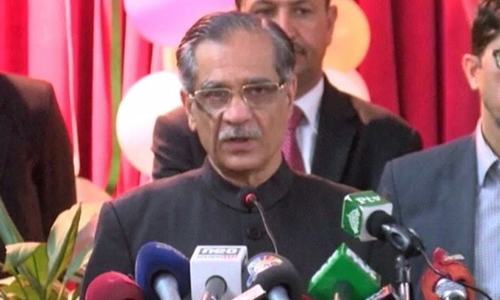WHEN America’s founders were mulling over the constitution, the judiciary was to be the weakest of the government’s three branches: a gaggle of wise men that decided cases and avoided getting thwacked by the other branches. That hasn’t held true for Pakistan (or, for that matter, the US). The Supreme Court is more powerful today than ever before. It has sent home two prime ministers, struck down emergency rule, and held that it may review any amendment made to the Constitution, all in the recent past.
It also regulates itself: the commission that appoints judges to the superior courts comprises a majority of judges, and the council that recommends removal is made up entirely of judges. It attracts daily press coverage, and its original jurisdiction has spread wide. In short, the court occupies a place in our landscape that could once scarcely have been imagined. Criticism has followed: the time consumed in suo motu cases, an endless original jurisdiction, and the court’s forays in economic affairs.
Much of this is valid, especially the last complaint. Take the open wound that is Pakistan Steel Mills. Or the massive fallout our treasury faces via ICSID (an arbitration forum) tribunals, because the then chief justice Iftikhar Chaudhry voided agreements with foreign investors. There’s a reason, it turns out, that judges tread lightly when it comes to the economy.
What would our history be if the judges remained passive?
Other critiques don’t hold, as with the contention that the Supreme Court wastes time on cases it takes up itself. Even during the height of the Chaudhry era, cases entertained by the court under Article 184(3) made up, on average, less than one per cent of the total number of cases instituted in court. As for venturing into territory unknown, the court only began exploring the nature of its original jurisdiction as late as 1988. Its scope is clearer today, and will continue to become clearer. The strongest criticism applies to the judiciary as a whole: a swelling caseload, the appalling delay in disposal, and the state of our lower courts.
Yet the answer lies in a stronger Supreme Court, not a weaker one. Those wishing for a weaker judiciary do so not because of the shortcomings above (which were there long before the judges asserted themselves), but because that assertion has been at the cost of a political class they belong to, plead cases for, or receive advertisements from.
For starters, let’s look at what came before, and whether we’re worse off today. Almost without exception, the judiciary would buckle to the executive of the moment. Even bright spots came with caveats. For instance, the Asma Jillani decision was an indictment of martial law only after martial law was over. The Hamood-ur-Rehman Commission slammed Yahya and Niazi, but stepped around sitting officeholders (Bhutto and Tikka Khan). Meanwhile, the judiciary lolled around helpless as the executive hammered away at it. Of ZAB’s seven amendments to the constitution, five declawed the judges. Gen Zia buried judicial independence via the PCO. Benazir ‘packed’ the bench with her chosen ones. Nawaz had his goons attack the court, while his brother allegedly dictated verdicts over the phone. Musharraf locked up the judges in their homes. And Asif Zardari waited until the Long March paralysed Pakistan before restoring the chief justice.
One wonders how our history would pan out, had the judges remained as passive. Justice Chaudhry would never have taken notice of a girl’s flogging in Swat in 2009 — what the ANP called a ‘conspiracy’ even as the Taliban claimed it. The suo motu that encouraged outrage against the peace deal, one that both civilian and military leaderships had backed, would never have happened.
Chaudhry’s successor, Justice Jillani, would never have authored the broadest interpretation of minority rights we’d ever seen. And Justice Ejaz Afzal Khan would never have cried halt to the largest land grab ever enabled by an entire provincial apparatus, and lent a sympathetic ear by our press.
Our commentators would do better to base their opinions on the soundness of the law laid down, rather than which persons are in the dock that week — something that extends to Mian Nawaz Sharif. Even leaving aside the fact that the Sharifs have been decades-long beneficiaries of judicial verdicts, three different benches have already rejected NAB’s appeal in the Hudaibiya case; overturned Khawaja Asif’s disqualification; and suspended Nawaz’s sentence in the Avenfield reference. The charge of judicial vendetta tends to fall flat.
Where the omission truly lies is in the convictions that aren’t happening, instead of the ones that are: the military establishment remains sacred. Despite stealing an election, generals Beg and Durrani are free men. The travesty of missing persons has gone nowhere. Defence societies have multiplied, while peasant farmers in Okara are greeted with silence. And Ehsanullah Ehsan remains unpunished.
In sum, a stronger Supreme Court has been good for this country. But its anthem, ‘justice for all’, requires listening to.
The writer is a lawyer.
Published in Dawn, December 30th, 2018















































